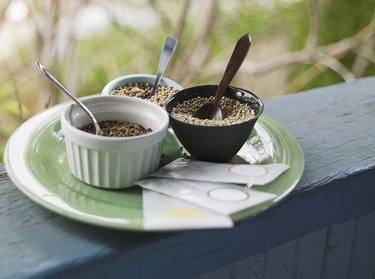
The benefits of drinking soursop tea may include some antibacterial and antiviral effects, as well as protection against certain cancers. The tea may also reduce inflammation, relieve pain and help prevent ulcers.
Tip
Research on the benefits of soursop tea is very limited and preliminary, but it may help prevent certain types of cancer, relieve inflammation and reduce pain.
Video of the Day
Benefits of Soursop Leaves
Soursop, otherwise called graviola, is a common fruit of Southeast Asia, Africa and South America, reports Cancer Research UK. The scientific name for this fruit is annona muricata, and chemicals called acetogenins are believed to feature prominently among the active ingredients. The fruit has a tropical flavor that is sweet and slightly sour.
Video of the Day
Test tube studies show that extract of soursop is effective against an array of parasites, bacteria and viruses, including the herpes virus, according to the Memorial Sloan Kettering Cancer Center. Preliminary lab studies indicate soursop has pain-relieving, anti-inflammatory and anti-ulcer properties. Early investigations also show the value of soursop leaves for treating diabetes.
Although no human studies have been done, test tube and animal experiments have demonstrated the potential use of soursop leaves to treat cancer. This research suggests it may have value in fighting lung, breast, prostate, skin, pancreas and liver cancers.
People have traditionally used soursop to treat other ailments, including obesity, insect stings, respiratory tract infections, kidney disorders and heart disease. These uses aren't backed by any science yet, according to a July 2018 study published in the Arabian Journal of Chemistry.
Soursop Leaves' Side Effects
Little is known about how soursop affects the body. Scientists are concerned about some chemicals in the fruit that cause movement disorders and nerve damage when consumed in large amounts, according to Cancer Research UK. Studies show certain chemicals can enter the brain from the bloodstream and produce nerve changes that resemble the symptoms of Parkinson's disease.
Animal studies indicate soursop may lower blood pressure and blood sugar. While these are healthful effects, anyone who takes medications for high blood pressure or diabetes should be aware of them. Since soursop may have an additive effect, it's possible that it could drive blood pressure or blood sugar too low when taken with these drugs.
In addition, soursop supplements may cause kidney or liver damage if taken frequently. On the other hand, eating foods or drinking beverages containing soursop isn't likely to cause adverse effects, if the dietary elements are part of a normal eating plan, writes Cancer Research UK.
Foods that Reduce Cancer Risk
According to the University of Texas MD Anderson Cancer Center, diet can't prevent cancer, but healthy foods can reduce the risk. Eating for cancer involves three aspects:
- Avoiding foods that increase cancer risk
- Eating in a manner that promotes weight management
- Consuming plant foods: fruits, vegetables, nuts and whole grains
Plant foods are bountiful with phytochemicals that can help protect against chronic diseases like cancer. Some of the best-known are berries, which are rich in vitamin C and antioxidants that are protective against certain types of cancer.
Grapes are an excellent sources of the antioxidant resveratrol, which may help prevent cancer of the breast, liver, stomach and lymphatic system, notes the University of Texas MD Anderson Cancer Center
Studies show broccoli and other cruciferous vegetables, such as cauliflower, kale and Brussels sprouts, contain compounds that may help prevent stomach cancer and malignancies of the mouth and esophagus.
Other especially-beneficial foods for cancer include tomatoes, which have lycopene, an antioxidant that may help protect against prostate cancer. Whole grains, such as oatmeal and quinoa, are a good source of fiber, a food constituent that curbs appetite and assists in weight management.
- Cancer Research UK: "Graviola (Soursop)"
- Memorial Sloan Kettering Cancer Center: "Graviola"
- Arabian Journal of Chemistry: "Annona Muricata: A Comprehensive Review on Its Traditional Medicinal Uses, Phytochemicals, Pharmacological Activities, Mechanisms of Action and Toxicity"
- University of Texas MD Anderson Cancer Center: "36 Foods That May Help Lower Your Cancer Risk"
- University of Texas MD Anderson Cancer Center: "5 Foods That Help Lower Your Cancer Risk"